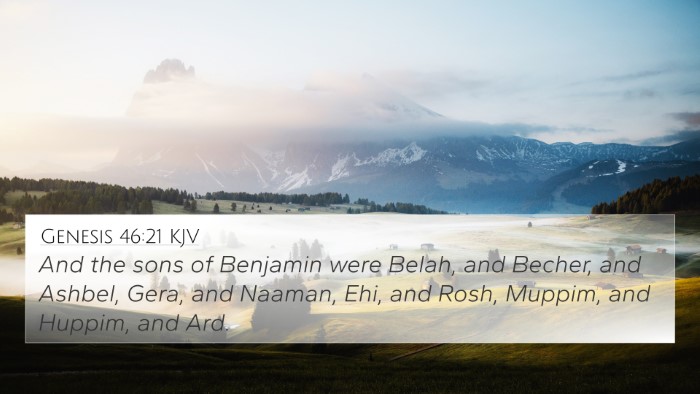Understanding Numbers 26:38
Verse Context: Numbers 26:38 states, "The sons of Benjamin after their families: of Bela, the family of the Belaites: of Ashbel, the family of the Ashbelites: of Ahiram, the family of the Ahiramites." This verse is part of the broader census taken by Moses for the tribes of Israel.
Summary of Biblical Insights
This verse serves as a record of the descendants of Benjamin, one of the twelve tribes of Israel, highlighting the families that emerged from him. Such genealogical records are essential for understanding the heritage and distribution of the tribes within Israel. Below are insights compiled from various public domain commentaries:
-
Matthew Henry:
Henry emphasizes the significance of genealogies in Scripture, noting how they authenticate God's promises and providential guidance throughout history. The families mentioned connect directly to God's covenant with Abraham, Isaac, and Jacob.
-
Albert Barnes:
Barnes explains that each family listed represents the larger identity of the tribe of Benjamin, underscoring the importance of family units in ancient Israelite society. The inclusion of family names highlights how God honored these lineages.
-
Adam Clarke:
Clarke elaborates on the tribal divisions and their implications for land inheritance in the Promised Land, mentioning how Benjamin was given a special status and how these family names contribute to understanding tribal dynamics.
Thematic Connections
The listing of the families in Numbers 26:38 offers a rich tapestry of themes found throughout the Scriptures. Here are some of the thematic and scriptural connections:
-
Genealogy and Promise:
The genealogies highlight God's faithfulness to His covenant promises, linking this section to Genesis 49:10, where Jacob blesses his sons, stating that the scepter shall not depart from Judah.
-
Division of Land:
This verse connects to the later allocation of land among the tribes in Joshua 18:11, emphasizing how tribal families play a role in the territorial distributions.
-
Tribal Identity:
Familial names are essential for identity, related to passages like Deuteronomy 33:12, which celebrates the tribe of Benjamin as the beloved of the LORD.
-
Historical Records:
This verse’s emphasis on family lineages lays the groundwork for understanding the history of Israel, akin to 1 Chronicles 8:1-2 that also traces the genealogy of Benjamin.
-
Divine Election:
Referencing God's choice of tribes, we see parallels in Romans 11:1 where Paul asserts God's continued plan for Israel, affirming that God has not rejected His people.
-
Fulfillment of Prophecy:
Passages such as Jeremiah 50:4-5 reflect God's future restoration of Israel, linking it back to the tribes, including Benjamin.
-
Kingly Line:
Connecting further to the New Testament, Matthew 1:2-3 traces Jesus' lineage through Judah but acknowledges Benjamin’s importance in the broader messianic promise.
Cross-References for Further Study
To enhance your study of Numbers 26:38 and its implications, consider these cross-references:
- Genesis 35:18 - The birth of Benjamin to Rachel.
- Joshua 18:11 - The land given to the tribe of Benjamin.
- Judges 20:12 - A conflict involving the tribe of Benjamin.
- 1 Chronicles 8:1-3 - A detailed genealogy of Benjamin.
- Romans 11:1 - Paul’s inquiry about Israel and God’s people.
- Jeremiah 50:4 - Prophecy concerning the restoration of Israel.
- Matthew 1:12 - Jesus’ genealogy including Jacob and his descendants.
Christian Application
Numbers 26:38 not only serves as a historical account but also challenges readers to consider their own spiritual heritage. Just as the Israelites were a people defined by their lineage and covenant with God, Christians today can reflect on their identity in Christ, as illustrated in Galatians 3:28-29, where believers are recognized as children of Abraham through faith.
Conclusion: The Importance of Cross-Referencing
Being mindful of the connections between biblical texts, including genealogical passages like Numbers 26:38, provides depth to our understanding of Scripture. Utilizing tools for Bible cross-referencing, such as a Bible concordance or a cross-reference guide, can enhance your study and reveal the rich tapestry of God's plan through the narratives of the Bible.
Through these connections, readers can pursue an in-depth biblical study that honors the complexities and intricacies of Scripture, encouraging a deeper exploration of God's Word.






